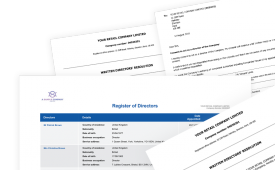Under the Companies Act 2006 various company decisions must be made via resolutions. Certain of these decisions, generally those that are most important or sensitive, must under company law be passed by a special resolution. More routine decisions are passed by ordinary resolution.
Special resolutions are required for few (and rare) company changes, such that a majority of companies will operate for years without the need to pass one.
In this article we look at:
- What a special resolution is
- The circumstances in which it is required
- How to pass a special resolution
- Notice and record keeping requirements.
Manage a UK company?
Inform Direct makes it easy by keeping statutory books and filings up to date.
If you need special resolution templates we have them (and many more) available in Inform Direct.
What is a special resolution?
A special resolution is a method of passing a company decision that requires at least 75% of the votes cast by shareholders to be in favour of it. The more ‘ordinary’ company decisions require an ordinary resolution to be passed. By contrast these are passed by shareholders with a simple majority – more than 50% – of the votes cast.
The special resolution regime helps to protect minority shareholders against important decisions being taken without proper consideration. In areas covered by a special resolution, a shareholder or group of shareholders together holding 25% of the shares can effectively oppose a resolution.
The need for a special resolution may help good decision-making, ensuring important changes are better considered
The need for a special resolution may help good decision-making, ensuring important changes are better considered and an effort made to gain wider support than a simple majority. Of course, the special resolution regime can also work to a company’s disadvantage – when a required transaction is blocked by an intransigent minority.
What decisions require a special resolution?
The Companies Act 2006 defines a number of transactions which require a special resolution to be passed, including the following:
- To change the company name
- To amend the company’s articles of association
- A reduction in the company’s share capital
- Disapplication of shareholder pre-emption rights
- Certain cases where the company purchases its own shares
- The winding up of the company voluntarily (or by the court)
- Changing the company’s status by registration, for example:
- From an unlimited company to a limited company (or vice versa)
- A private company to a public company (or vice versa).
You can find templates for these – and more – in Inform Direct.
In addition, the company’s articles of association can also specify other transactions where special resolutions are required. Such a provision may be included in the company’s articles where the shareholders want an extra level of protection against certain decisions being taken rashly.
The Companies Act also permits other decisions to be passed by special resolution even if they might ordinarily be passed by an ordinary resolution.
How is a special resolution passed?
A special resolution is passed if the votes ‘for’ equate to at least 75% of the total votes cast by each shareholder’s voting rights.
The special resolution is either voted on via:
- A show of hands or poll at a general meeting of shareholders, potentially alongside other company business
- A written shareholders’ resolution.
It’s important to use the right type of resolution. If you use an ordinary resolution where a special resolution is required, or don’t follow the correct procedure, the resolution could be invalid.
Example
Two weeks before a general meeting (the required notice period), it is proposed that a vote be taken on a special resolution to change the company’s name.
At the meeting, voting commences on the proposed special resolution to change the company’s name.
The company has 4,000 shares with equal voting rights, which are split between 7 shareholders in varying proportions. Only 5 shareholders are present at the meeting and voting. One shareholder casts their vote by proxy.

As the votes ‘for’ the special resolution were 75% the resolution passed (at least 75% is required to pass). This was recorded in the minutes of the meeting.
Which special resolutions must be filed with Companies House?
Companies House require passed special resolutions to be filed with them within 15 days.
These can be sent to Companies House in paper form, or (since 2021) these can now be uploaded online to Companies House.
What records of special resolutions must be kept?
The company must keep minutes of all proceedings at general meetings, including any special resolutions proposed and the outcome. They must also keep copies of all special resolutions passed by written resolution.
These must be kept for 10 years and be available for inspection by shareholders on request.
What notice do special resolutions require?
To propose a special resolution at a meeting the following requirements must be met:
- The notice of the meeting contained the text of the resolution, and the intention to propose it as a special resolution
- The notice of the meeting was provided to all shareholders at least 14 days prior to the meeting
The Companies Act 2006 states that the company must “… where practicable, give its members notice of any such resolution in the same manner and at the same time as it gives notice of the meeting”.
Are there additional requirements for ‘listed’ companies?
Two copies of all resolutions made by companies with shares listed for trading on a market must be passed immediately to the FCA’s Primary Market functions department (previously known as the UKLA), who will make them available for public inspection.
When performing company secretarial duties for a ‘listed’ PLC. we’d recommend that you seek advice from an expert in such companies.
This article was first published in 2014. The most recent update was on 25 August 2023.



A well written article making areas of Company Law easy to understand – Thank you
Awesome one, easily understandable